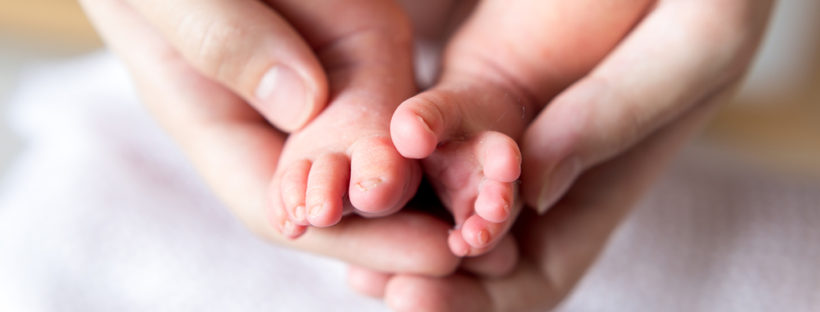Lori Boggan, RN, Certified Infant Massage Instructor
The power of human touch is unmatched and irreplaceable. It is an innate need of every human being, especially the infant. I recently sat down and picked the brain of an expert in the field of infant massage. Peter Walker, a London based physical therapist, who has been working with babies, children, and their parents for over 40 years. He travels the world and has trained nearly twenty thousand or more midwives, nurses, and other health professionals through his Developmental Baby Massage and Movement program. In his words “touch is the newborn’s first language-it is her prime means of communication and plays an essential role in the forming of early parent-child relationships.” The following are just a few of the many benefits of touch and massage to both the infant and parents.
Skin to Skin
Study after study has shown the unbelievable benefits of placing an infant skin to skin with its parent. The power of touch is evident from the first moments after birth when the infant is placed skin to skin. Remarkably, the infant’s temperature, heart rate, breathing, and blood sugar stabilize while being comforted on their mother or father’s chest. Touch begins here. A bond between parent and infant begins here.
Enhanced Immunity
The simple act of skin to skin with the mother sets forth an intricate orchestration of colonization and antibody formation that is transferred from mother to baby through the breastmilk. A study done at John Hopkins University found a significant reduction of nosocomial infections in infants massaged daily with sunflower seed oil however a Cochrane review of this practice published in 2016 found the evidence lacking that emollient therapy would prevent invasive infections and cautioned that more research was needed..
Hormonal Influence
Done regularly, massage may reduce the level of the stress hormone, cortisol circulating in an infant’s bloodstream. In turn, it may increase the level of endorphins, the body’s natural opiates as well as oxytocin, the love hormone. Both leave the infant with a sense of well being and further promote attachment between parent and child.
Colic & Gas Relief
The jury is still out on the exact the cause of colic. Colic starts as early as the few weeks after birth and results in crying for long periods of time-particularly at night. Massage may relieve a distressed and colicky baby. Regular tummy time and massage of the stomach may ease gas, constipation, and aid in digestion. It is best to avoid tummy time and massage directly after a feed.
Joint Flexibility & Increased Muscle Strength
According to Peter, developmental massage, practiced according to his program “releases ‘physiologic flexion’ imposed by the fetal position from the time the infant spends in utero. Gentle massage together with soft stretching can allow the infant to relax and coordinate their muscles to improve the circulation to their body’s extremities, open the chest to deepen their breathing volume, relax the tummy to assist digestion and disposition, and strengthen the muscles of the head, neck and back in preparation for (upright postures and movement).”
Develops Trust & Confidence
Infants learn through touch. The gentle, reassuring hand of a parent teaches the infant early on that his or her needs will be met. Touch and massage further foster a deep bond between infant and parent. The infant learns to trust and the parent develops confidence in his or her ability to care for the infant.
Benefits to Parents
A 2011 study in the Journal of Perinatal Education found “participating fathers were helped by increasing their feelings of competence, role acceptance, spousal support, attachment, and health and by decreasing feelings of isolation and depression.” Other studies have shown that mothers that massage their infants have improved mood and decreased symptoms of depression.
Educating Parents
Nurses and midwives at the bedside have an excellent opportunity to teach the benefits of skin to skin and massage. Early education should start right at birth by encouraging immediate and regular skin to skin contact. In addition, parents can be taught simple techniques as seen here. It is best to use oil for massage so the hands move nicely against the skin. For sick or unstable infants in the Neonatal Intensive Care, teaching parents and family members the importance of touch in the form of a gentle hand is essential. By simply placing and holding a steady hand over the infant that is confined to an incubator or radiant warmer, we are still able to convey trust and reassurance. Early massage can begin when the infant is stable and willing.
Peter sums it up perfectly, “from the very beginning, the mother should remain at the center of any “treatment” offered to her baby. Most mothers want to hold their babies and establish skin to skin contact before the baby is removed, weighed, measured, bathed, or dressed. From his mother’s womb into her arms, touch becomes the primal language of the newborn, and it is through holding and caressing that a baby is made to feel welcomed and loved.”
AWHONN Resources
- Healthy Mom&Baby Newborn Skin Care Zone
- Breastfeeding Support
- Duration of Uninterrupted Skin-to-Skin Contact
- Diapering That Nurtures
Additional Resources
- The Babies Website
- Effect of topical treatment with skin barrier-enhancing emollients on nosocomial infections in preterm infants in Bangladesh: a randomized controlled trial.
- Changes in plasma cortisol and catecholamine concentrations in response to massage in preterm infants
- Supporting Fathering Through Infant Massage
- Effect of massaging babies on mothers: Pilot study on the changes in mood states and salivary cortisol level
- Early skin-to-skin contact for mothers and their healthy newborn infants
- Massage Increases Oxytocin and Reduces Adrenocorticotropin Hormone in Humans
 Lori is an American Neonatal Intensive Care nurse that has made her way to Sweden. Her passion is maternal and infant education. She incorporates her years of work in maternal and infant health with a passion for wellness through her Prenatal Yoga, Mommy & Me Yoga, and Developmental Infant Massage classes in Gothenburg, Sweden. Follow her adventures on Instagram or through her nursing blog, Neonurse.
Lori is an American Neonatal Intensive Care nurse that has made her way to Sweden. Her passion is maternal and infant education. She incorporates her years of work in maternal and infant health with a passion for wellness through her Prenatal Yoga, Mommy & Me Yoga, and Developmental Infant Massage classes in Gothenburg, Sweden. Follow her adventures on Instagram or through her nursing blog, Neonurse.

